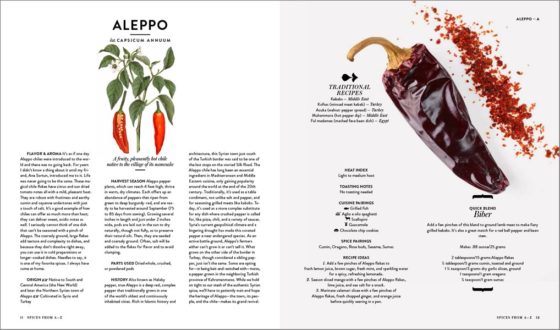The Spice Companion: A Guide to the World of Spices by Lior Lev Sercarz
There comes a time in every cook’s life when you start to move beyond simply following recipes and begin to experiment more and more within those recipes. After that, more advanced cooks will reach for the next level — the graduate level, if you will. It is books like The Spice Companion that become part of your graduate food studies. Instead of dealing in the generalities of a specific cuisine or specific dishes, you go into the details of specific ingredients in your food. You dive deeper into more and more detailed levels of knowledge, so that, at the end, you emerge with a deeper understanding of how those ingredients come together in a recipe. With this deep knowledge, you can begin to create our own unique recipes.
The Spice Companion begins with some extensive and excellent information on the author’s personal spice philosophy, the history and origin of various spices, and how to source, blend and store spices. At its heart, though, The Spice Companion is an amazing reference book for spices of all types. A few random flips through the largest part of the book turned up spices I knew — like cinnamon and cloves — spices I had heard of but never used — like za’atar and wasabi — and spices entirely unknown to me — like Urda chiles and Sansho.
The detailed spice sections are amazing in their depth and include a photo and/or drawing of each spice, a description of its flavor and aroma, it’s geographic origin, its harvest season, which parts of the plant are used — like leaves, stems, seed pods, etc –, and an extensive About section that provides even more information about typical uses and dishes that can be made with the spice.
The author then uses a graphical icon-based system to show which dishes might use this spice, other spices that can be paired with it, recipes for spice blends with this ingredient and finally, a recipe that uses this spice blend. Wow! It is almost overwhelming.
There is so much information to be found within the pages of The Spice Companion. I can foresee reading in a random fashion, jumping from one spice to another, but also then revisiting it later for a full cover-to-cover read to deeply enhance my spice, blends and overall food knowledge. This is a book that should find a place alongside your regular collection of cookbooks to offer more specific information on spices while also giving your great ideas on how recipes might be “dressed up” or enhanced by the use of alternative spices
This is a book that should find a place alongside your regular collection of cookbooks to offer more specific information on spices while also giving your great ideas on how recipes might be “dressed up” or enhanced by the use of alternative spices. It is the equivalent of a writer having a great dictionary or encyclopedia at hand when they work. There are times when you simply NEED to look something up and The Spice Companion would be a great place to turn.




